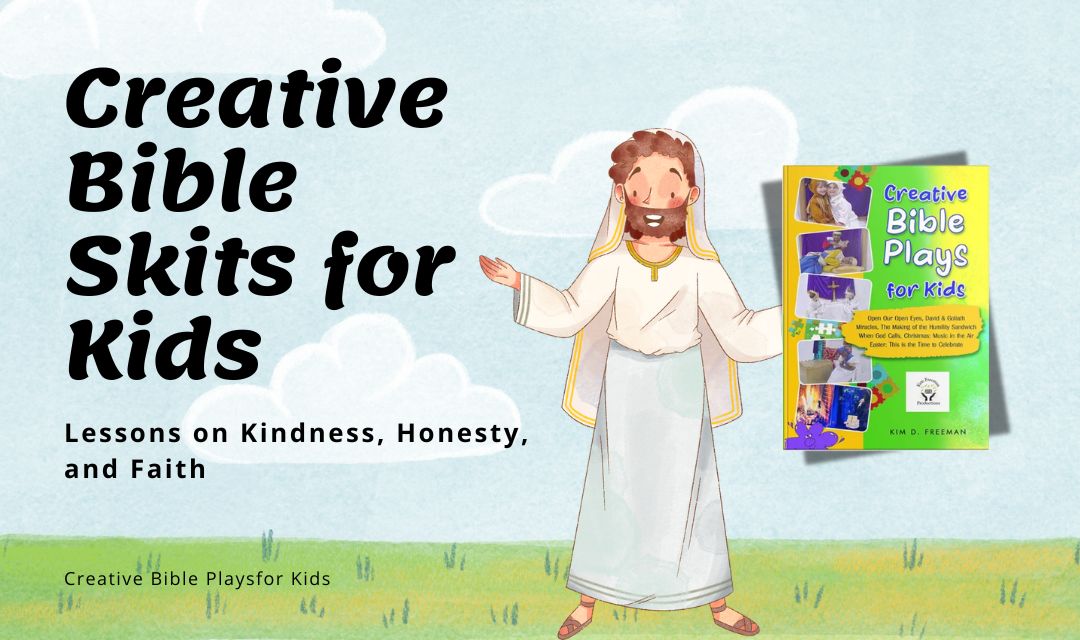Have you ever thought what could be the best way to bring the knowledge of the Bible to life in a way that children can understand? Just imagine children experiencing biblical stories personally rather than simply reading them. Bible Skits For Kids is an interesting and engaging approach to teaching basic principles such as compassion, honesty, and faith.
In this article, we’ll analyze how to turn Bible skits into conceptual ideas, allowing children to interact with literature on a deeper level.
The Impact of Bible Skits for Kids in Teaching Values
Kim D. Freeman, in her book Creative Bible Plays for Kids, emphasizes the power of dramatization in teaching biblical values. This first-hand experience is more than just hearing a story. For example, a performance about the Good Samaritan might help kids fully understand the actual meaning of kindness and compassion, inspiring them to think about how they can be nice to others in their own lives. Similarly, a comedy about Joseph and his brothers might highlight the value of forgiveness and the risks of envy.
Stories have always had a strong influence on individuals. They attract our minds, evoke emotions, and give meaning to difficult concepts. Biblical stories teach moral values, courageous acts, and outcomes of both good and evil choices. They could also be rated as spiritual skits that help children reflect better in their lives and become better individuals of the society.
Children can actively engage in the learning process by adapting these stories into skits. They may put themselves in the shoes of biblical figures, go through their trials, and learn the outcomes of their decisions.
This first-hand experience is more than just hearing a story. For example, a performance about the Good Samaritan might help kids fully understand the actual meaning of kindness and compassion, inspiring them to think about how they can be nice to others in their own lives. Similarly, a comedy about Joseph and his brothers might highlight the value of forgiveness and the risks of envy.
Kindness: Showing Love in Action
Being kind is a core Christian virtue, and the Bible is replete with examples of people who showed great kindness. Children can better understand the practical uses of kindness and be motivated to apply it in their everyday lives by performing these stories.
The Good Samaritan (Luke 10:25-37): This story serves as an influential example of neighborly love. The value of helping people in need, regardless of their background or social standing, can be emphasized in a skit that tells this story. Kids can discover that kindness covers everyone they come into contact with, not just their close friends and relatives.
Jesus and the Children (Mark 10:13-16): This narrative demonstrates Jesus’ love and sympathy. Jesus greeting children in a performance highlights the value of showing respect and affection to everyone, including those who are often ignored.
Honesty: The Foundation of Trust
Another important quality that is highlighted throughout the Bible is honesty.
Ananias and Sapphira (Acts 5:1-11): This narrative serves as a warning on the risks of lying. Children can learn that honesty involves being true to God and oneself as well as to others by watching a skit that portrays this incident.
Jacob and Esau (Genesis 27): This story discusses the results of dishonesty and the value of honesty. Children can learn the importance of honesty in maintaining positive connections and building trust through a skit.
Faith: Believing in the Unseen
The foundation of Christian belief is faith. Skits that depict biblical instances of unshakeable trust in God may help in the understanding of faith.
Noah’s Ark (Genesis 6-9): Noah’s firm trust in God’s instructions is shown in this story. Children can learn that faith is believing in God even when faced with impossible tasks.
Daniel in the Lions’ Den (Daniel 6): This narrative demonstrates Daniel’s bravery and unshakable confidence in God despite facing danger. Children can learn from a skit that faith can offer courage and safety during trying times.
Bible Musical Plays: Bringing Bible Stories to Life
Bible Musical Plays provide a more engaging method of teaching values than straightforward skits do. These performances use dance, song, and music to increase audience participation and provide a more memorable educational experience. Children’s excitement for studying the Bible can be sparked to new heights by Bible Musical Plays.
Music has a special power to improve memory and evoke strong feelings. Children can learn important lessons and passages in an entertaining way by integrating music into Bible plays. The stories and their moral lessons can be recalled with the help of the melodies and rhythms.
Additionally, the cooperative aspect of staging a musical theater promotes communication, cooperation, and a feeling of community.
Useful Tips for Implementing Bible Plays and Skits
- Don’t complicate: Use concise and simple language, and choose age-appropriate stories.
- Encourage involvement: Regardless of a child’s prior acting experience, allow them to engage.
- Employ basic costumes and props: Simple objects can work just as well as more complex sets or costumes.
- Pay attention to the message: Highlight the important lessons each play or skit teaches.
- Make it enjoyable: Establish a welcoming and supportive environment where kids can express themselves without fear.
Conclusion:
Bible skits for kids have significance in encouraging spiritual development because they enable kids to relate to biblical stories on an intellectual and emotional level. The lessons become more memorable due to the multi sensory learning experience these performances provide. As kids collaborate on the performance, spiritual skits further promote empathy, cooperation, and teamwork. Bible skits emphasize teachings of kindness, honesty, and faith while also fostering spiritual and social development.

